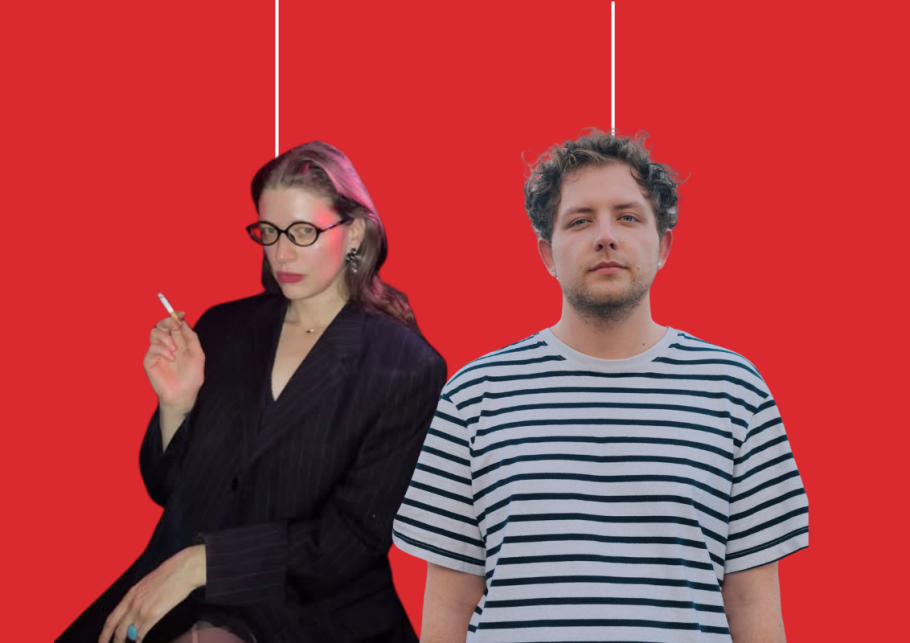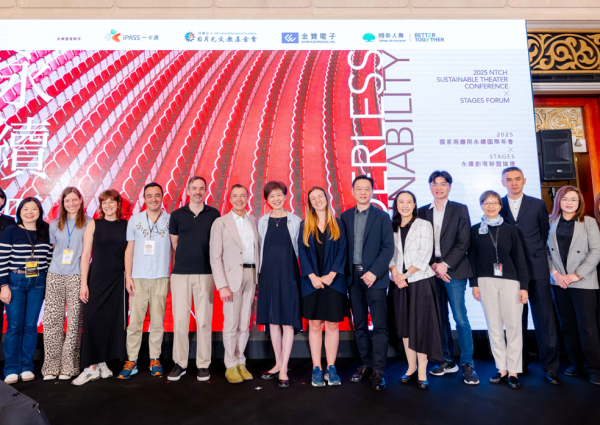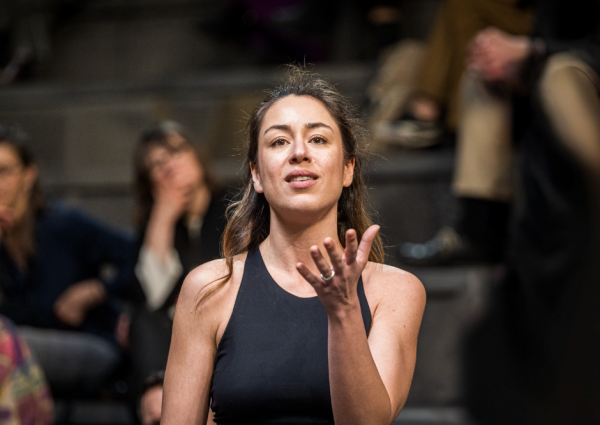We are thrilled to announce the two new European contemporary drama texts selected by the ETC Drama Committee for 2025.
Chosen from a pool of 17 high-quality submissions representing 16 ETC Theatres across 10 countries, these plays exemplify the richness, diversity and complexity of European theatre today.
ETC will support the two texts with a grant (up to €1,500) for their translation into English and contribute to their international circulation.
The 2025 selected texts:
- Darling, Svenja Viola Bungarten (2025) -
Deutsches Theater Berlin (Germany/Berlin) - who run for happiness, Jaka Smerkolj Simoneti (2024) -
Prešernovo Gledališče Kranj (Slovenia/Kranj)
Honorary mention:
- In Search of Lost Language, Goran Vojnovic (2024) -
Slovensko Narodno Gledalisce Nova Gorica (Slovenia/Nova Gorica)
Learn more about the plays below.
- Darling, Svenja Viola Bungarten (2025)
Deutsches Theater Berlin (Germany/Berlin)
The giant corporations NEVER and IMMER (‘Always’) are vying for a monopoly position on the market and to invent the next innovative feminine hygiene product. CEOs Franka and Bettina want to buy up each other's companies and get at each other's throats. Their children vie for the inheritance and the affection of their mothers, while their confidants, consultants and interns scent their own career opportunities. Complex intrigues and affairs unfold in this “career comedy”, as do unexpected alliances.
Inspired by pop culture references such as the films, The Favourite, The Devil Wears Prada and the series Succession, the play explores the costs of success and the ways women participate in patriarchal systems. It states the question, what does power do to feminism and what kind of power does feminism need?
The ETC Drama Committee was particularly impressed by Darling's bold stylistic approach and sharp thematic focus. They praised the play’s “highly original and timely” exploration of power dynamics and 'patriarchal femininity', noting its “compelling combination of well-made play and grotesque characterisation.” The use of pop culture references was highlighted as a fresh and effective device, offering a “TV-series-like narrative” that is both witty and fast-paced. One juror remarked that, “out of all the plays focussing on our threatened democracy, this one has the most specific and unique perspective.”
- who run for happiness, Jaka Smerkolj Simoneti (2024) -
Prešernovo Gledališče Kranj (Slovenia/Kranj)
The primary theme of the play "who run for happiness" is running. We follow a group of runners of various ages and genders who don’t know each other but meet for group recreation. The story is framed as a journey of this random group, which responded to a Facebook invitation, running from the city through the forest on an evening run. As they run through space, the stage directions reveal the decay of a certain era.
Through inner first-person monologues that intertwine between the unnamed speakers, the intimate worlds of the runners are revealed to the audience. These monologues explore recreation as a way of “healthy” disconnection from reality and diagnose various reasons behind the need for such an escape. "who run for happiness" is an analysis of the current state of the world and the individuals who can no longer find their place in it. One of the main themes is the infiltration of fear into all spheres of an individual's life and the neoliberal ways of dealing with that fear. The text examines how neoliberal logic has permeated individual psychology. Each runner tries to become the best version of themselves. The landscape where this unattainable desire for improvement is inscribed is the individual's body.
The runners constantly switch between thoughts about the physiological processes taking place in their bodies and the broader contexts in which those bodies exist. The play does not have main protagonists; none of the characters are named, and it is written in a way that is as inclusive as possible for a potential theatrical performance. It can be performed by a single actor or a large group. Words in a multitude of bodies change their nature and no longer remain solely within the domain of individual psychology but open up as a wound of a collective mental state.
Running is a response to distress. Running is an answer to the fear of loneliness, aging, and death. Running is a way to create the most beautiful version of one’s body. Exhausting one’s body is a form of rest. Running is an answer to the relentless rhythm of the world. As the runners run, the stage directions reveal an apocalyptic vision of the world as the rise of radical political options, pervasive states of war, and ecological catastrophe are an inevitable destiny toward which our path is heading. In these occasionally poetic notes, the concreteness of running meets supernatural images of nature, with protagonists such as trees and birds completing the circuit of a complex ecosystem.
The title of the play thus resonates on multiple levels. On the one hand, all the runners desire is happiness, and they pursue it through running. On the other hand, the dystopian vision of the future poses the title as an ironic question: is it even possible to catch happiness, will we ever be able to stop running?
The ETC Drama Committee appreciated who run for happiness for its layered structure and strong performance potential, noting how it uses the “seemingly light and dynamic theme—running” as a powerful metaphor for a range of societal and psychological issues. They highlighted the play’s “excellent structure,” with “interweaving inner monologues of a choir-like community” that create an emotionally rich and thought-provoking experience. The text was praised for its “humorous, sharp and subtle” commentary on contemporary life, with its flexible cast and minimal staging seen as assets. One juror emphasised the “potential to play with rhythm in language and translation,” calling the theme “one that resonates with everyone.”
Honorary mention for:
- In Search of Lost Language, Goran Vojnovic (2024) -
Slovensko Narodno Gledalisce Nova Gorica (Slovenia/Nova Gorica)
Set in the early 1960s, it the story of two brothers of Slovenian origin who, due to their violent father, took separate paths in life during their early adulthood. Each ended up on a different side of the Slovenian-Italian border. The first, Giuseppe Materazzi (or Marjan Ramovš) became a prominent figure in the Italian fascist regime, while the second, Stane Ramovš, rose to a position in the Yugoslav administration. The story begins when the first brother, Giuseppe, suffers a stroke and, as a result, begins speaking the language of his childhood—Slovene, his mother tongue, which he had successfully hidden from everyone, including his own family, for decades. In this "lost language," he also expresses an unusual yet intense desire to reunite with his brother, with whom he hasn’t spoken in decades. Since his son, Roberto, cannot understand him, the only person who can assist in communication is the housekeeper Anna/Ivana, who, like Giuseppe, hides her national origin while working for a fascist.
Stane is simultaneously fighting his own battle. His position in the state leadership is threatened by his daughter Mateja, who, along with her friends, staged a protest art performance in which the group ran naked across Revolution Square. Stane’s colleague Franc managed to get Mateja out of detention, but Stane knows that in the given system, no favor comes for free. Franc is a man of a new world, better suited for the new times—he believes in nothing except the power of authority. As Stane tries to smooth things over within his family and beyond, Giuseppe and Anna appear at his doorstep. When Franc soon arrives, smirking as he catches Stane with his fascist brother, Stane realizes that all is lost. Or perhaps not. Perhaps Giuseppe’s arrival is, after all, an opportunity for both of them to escape the abyss of ideological delusions. But as the brothers at least attempt to reconcile, it becomes clear that the rifts between people are varied and that the divide is not just one.
The ETC Drama Committee acknowledged In Search of Lost Language with an honorary mention, recognising the author’s “complexity and proficiency” grounded in his strong professional background. They commended Goran Vojnović for his ability to explore the legacy of Yugoslavia “on a collective and an intimate level,” highlighting his “deep emotions and meticulous psychological characterisation.” The play’s reflection on how politics, society, and environment shape personal relationships was seen as powerful and universally resonant, transcending geographical and historical boundaries.
Below, you will find the remaining submissions. Although they were not chosen for this year's selection, they were praised for their quality:
-
The Democratic Game, Constance de Saint Remy (2025) -
Théâtre Nanterre-Amandiers (France/Nanterre) -
Stummes Land, Thomas Freyer (2020) -
Staatsschauspiel Dresden (Germany/Dresden) -
ICTUS, Miguel Graça (2014) -
São Luiz Teatro Municipal (Portugal/Lisbon) -
Landscape with Radioactive Dogs, Espen Hjort (2023) -
De Toneelmakerij (The Netherlands/Amsterdam) -
No One to Blame, Tomáš Loužný (2024) -
National Theatre Prague (Czech Republic/Prague) -
DRAGO: It-Tvenvin ta’ Tornado Tony, André Mangion (2022) -
Teatru Malta (Malta/Valletta) -
30mg of Ulipristal, Benedetta Pigoni (2023) -
PAV (Italy/Rome) -
A Name in the Ashes, Nina Plavanjac (2024) -
National Theatre Belgrade (Serbia/Belgrade) -
Tirannosauro, Filippo Quezel (2023) -
Teatro Stabile del Veneto - Teatro Nazionale (Italy/Venice) -
Rijgen, Joachim Robbrecht (2019) -
Het Zuidelijk Toneel (The Netherlands/Tilburg) -
Behind the Enemy Lines, Lucas Samain (2024) -
Théâtre Nanterre-Amandiers (France/Nanterre)






